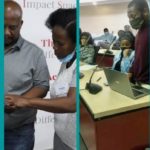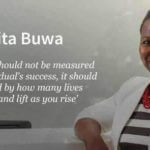Impact Stories from Empowering Women and Girls Policy Area

Fellow is first Jordanian to be named 2021 Influential Leader
Fellow(s): Hiba Shabrouq
Country: Jordan
Cohort: 2017
Policy Area(s): Education Diplomacy/Mentoring, Empowering Women and Girls, Entrepreneurship, Professional Growth, Youth Engagement
This week, 2017 fellow Hiba Shabrouq was named a 2021 Influential Leader by The Association to Advance Collegiate Schools of Business (AACSB), an international association that brings together business, students and educators to amplify innovation and impact business education. The annual initiative recognizes leaders who are using their business education to create impact.
Hiba, the first Jordanian to be honored by AACSB, was nominated by Princess Sumaya University For Technology. She was highlighted in the “Diversity and Inclusion” category. In her feature, Hiba is recognized for co-founding Ozwah, a 2017 TechWomen seed grant-winning mentorship and training program for Jordanian girls in orphanages. She is also a financial skills mentor at INJAZ, a Jordanian nonprofit that trains young people with entrepreneurship and financial skills.
Report Date...: 2/22/21

Through Ekasi Pioneers fellow helps over 100 rural businesses
Fellow(s): Nobukhosi Dlamini
Country: South Africa
Cohort: 2019
Policy Area(s): Economic Impact, Empowering Women and Girls, Entrepreneurship, Professional Growth
In response to the COVID-19 pandemic, 2019 fellow Nobukhosi Dlamini launched a digital enablement program that supports women-led small businesses in rural South Africa. The program, Ekasi Pioneers, is implemented through the GIFT Foundation, Nobukhosi’s NGO that connects rural women and girls to tech training and job opportunities.
Kicking-off with funding from the U.S. Consulate General Cape Town, GIFT created its first virtual digital enablement training for 50 rural female small business owners, supporting them in pivoting their businesses from in-person to online operations. Through a comprehensive curriculum which included lessons in digital marketing, purchasing and setting up a website, online advertising and scaling an online business, the women learned how to successfully migrate their businesses in order to adhere to local social distancing and lockdown regulations. They were also trained in soft skills, learning about leadership, confidence-building and adopting a growth mindset. At the end of the training, all 50 businesses – catering companies, construction businesses, retail stores and more – successfully migrated online. “These women are reporting that the visibility of their businesses has increased, they are receiving more inquiries and sales and their businesses have been able to weather the storms of the COVID-19 pandemic,” says Nobukhosi. GIFT has already begun a second digital enablement training with funding from the UK government; their cohort of 60 women is due to graduate later this month.
Report Date...: 2/15/21

Mentor(s): Sheryl Walton
Company: Autodesk
Mentor Type: Professional
Policy Area(s): Education Diplomacy/Mentoring, Empowering Women and Girls, Professional Growth
TechWomen mentor Sheryl Walton shared her lessons on mentorship, diversity and the importance of cultural exchange in a recent interview hosted by the U.S. Department of State’s Bureau of Educational and Cultural Affairs. The interview was a part of a month-long series in celebration of Black History Month that highlights women leaders sharing why diversity matters.
Sheryl, a senior manager for enterprise service desk and asset management at Autodesk, was interviewed by U.S. Department of State program manager Angela Woods and hosted on the Exchange Programs – U.S. Department of State Facebook page. During their conversation, Sheryl spoke about how she honors black history, and the importance of inclusion in the workplace: “The importance of us having a seat at the table is what is going to drive the success of technology,” she said. “It’s not going to happen by keeping us out.” Sheryl also spoke about serving as a TechWomen mentor and the lessons she’s learned along the way: “Be open, be honest, and bring another woman along with you during this journey,” she said. “I always try my best to send the elevator down to bring people back up.”
Report Date...: 2/15/21

Fellow speaks about being differently-abled in IBM feature
Fellow(s): Asna Javed
Country: Pakistan
Cohort: 2019
Policy Area(s): Empowering Women and Girls
2019 fellow Asna Javed shared about being differently-abled and overcoming challenges in a recent video feature from IBM. The video, You are Enough as you Are, was shared on the YouTube page for IBM’s Europe, Middle East and Africa (EMEA) Fast Start Women’s Experience, a platform that features inspirational lessons on resilience and hope from IBM employees. Asna is a lead developer advocate at IBM Pakistan.
Asna was born without arms, but was told as a child that she could accomplish anything. “My mom taught me that I could be whoever I want to be – she never even said I was different,” Asna said. Asna also spoke about the difficulties she has faced, and how she is motivated to show that she is just as competent as anyone else. “People around me always doubted my capabilities,” she said. “It made me resilient to prove them wrong and show them that I can be whoever I want to be.”
Report Date...: 2/15/21

Fellow authors post for UN Women’s Generation Equality
Fellow(s): Kyzzhibek Batyrkanova
Country: Kyrgyzstan
Cohort: 2019
Policy Area(s): Economic Impact, Education Diplomacy/Mentoring, Empowering Women and Girls, Entrepreneurship, Professional Growth
2019 fellow Kyzzhibek Batyrkanova authored a post for UN Women’s Generation Equality campaign, writing about the challenges women and girls face and calling for greater awareness of gender issues among educators, media and leaders.
Kyzzhibek is the program director for the Kyrgyz Space Programme, an all-women team working to build Kyrgyzstan’s first nanosatellite. The core team is comprised of women ages 18-24, many of whom are not trained in STEM fields. Together, they are learning skills in robotics, 3D printing, engineering and satellite technology, innovating for their country and combatting stereotypes along the way.
In her post, Kyzzhibek writes that many expect their project to fail, just because of their gender: “The first element [for failure] for them is the presence of women and girls in the team,” she writes. As a response, Kyzzhibek and her team are motivated to fulfill their mission of educating women and girls in STEM while raising awareness about inequity. “The program has an amazing mission to empower girls and women in science and raise awareness about gender inequality and harmful social norms, which require systemic change,” she writes. “We want to show by our own example that girls are capable of anything, even reaching for the stars.”
Report Date...: 2/8/21

Mentor(s): Paria Rajai (mentor)
Company: ModelExpand
Mentor Type: Impact
Policy Area(s): Economic Impact, Empowering Women and Girls, Entrepreneurship, Professional Growth
TechWomen mentor Paria Rajai recently co-authored an article on why women of color are historically undervalued when it comes to leadership roles, and the steps companies can take to spark systemic change. The article, Does Your Definition of Leadership Exclude Women of Color?, was published by Harvard Business Review.
Paria is the founder and CEO of ModelExpand, a workplace strategy firm centered on inclusion, fair hiring and helping companies build a diverse workforce. Paria’s co-author, Marlette Jackson, serves as an advisor for ModelExpand. “The attributes companies often look for in leaders, such as competitive, dominant, objective, self-confident, aggressive, ambitious, are overwhelmingly masculine,” they write. “This leaves women of color (WOC) at a double disadvantage: They often don’t fit companies’ measures for leadership, because those measures were developed for someone else.” Paria and Marlette argue that creating change does not necessarily require “reinventing the wheel;” instead, companies can start to redefine leadership by adjusting hiring and retention criteria and providing more resources to employees.
Report Date...: 2/8/21

Mentor(s): Jill Finlayson (mentor)
Company: Women in Technology Initiative at UC Berkeley
Mentor Type: Impact, Professional
Policy Area(s): Empowering Women and Girls, Professional Growth
TechWomen mentor Jill Finlayson has been moderating a regular speaker series that spotlights corporate leaders making a difference in the diversity, equity and inclusion space.
Jill, the director of the Women in Technology Initiative (WITI) at the University of California, works to promote the equitable participation and success of women in tech across four UC campuses.
The Leaders in Diversity, Equity and Inclusion Speaker Series highlights leaders from Uber, Amazon, Siemens and other corporations who share their journeys and insights as DEI advocates. Through amplifying diverse leaders’ successes and strategies, Jill hopes to encourage other companies to expand their DEI programs and works towards a more equitable workplace for all. WITI’s next event on February 16 will feature Shareka Nelson, the global head of diversity, inclusion and belonging at Coursera.
Report Date...: 2/1/21

Fellow shares advice for women entrepreneurs in Jordan
Fellow(s): Reema Diab
Country: Jordan
Cohort: 2019
Policy Area(s): Economic Impact, Education Diplomacy/Mentoring, Empowering Women and Girls, Entrepreneurship, Professional Growth, Youth Engagement
2019 fellow Reema Diab was featured in an “Ask Me Anything” session for women in technology, sharing her experience as an entrepreneur and answering questions on how to succeed as a woman in technology in Jordan. The event was organized by the Exchange Alumni team at the U.S. Embassy in Jordan as part of their monthly sessions that feature exchange program alumni.
Reema is the founder of Galaxy Organization for Technology, an IT non- profit that empowers women and youth with STEM skills. Their latest course for kids offers hands-on training in robotics, teaching them about Arduino technology and helping them build small robots controlled by phones via Bluetooth. At the online event, Reema spoke about what makes a successful entrepreneur, how new businesses can seek funding and how her participation in the TechWomen program helped build her entrepreneurial skills. She also shared the obstacles that women face as entrepreneurs, giving the audience advice on succeeding as a woman in technology. “It can be difficult as a woman trying to compete,” she said. “Unfortunately, women often are not confident or underestimate their skills. It’s important to find a support system and to find a mentor.” She encouraged women to find their passion and work hard on their skills by seeking out programs that support their goals. “The TechWomen program was life-changing. Gathering with like-minded women opened doors for me to be a leader,” she said.
Report Date...: 1/25/21

Fellow selected to train at academy for angel investors
Fellow(s): Zimkhita Buwa
Country: South Africa
Cohort: 2013
Policy Area(s): Empowering Women and Girls, Entrepreneurship, Professional Growth
This week, 2013 fellow Zimkhita Buwa began a two-month training at the African Angel Academy, an initiative that supports African entrepreneurs in refining their investment strategies, networking and investing in promising African startups seeking early-stage investing. Zimkhita is one of 80 entrepreneurs chosen for the 2021 cohort.
Zimkhita is a member of Dazzle Angels, a women-led angel fund that invests in women-owned startups. Through her participation in the African Angel Academy, she hopes to learn from like-minded investors who are looking to make an impact on the African continent. “I want to make a difference in the angel investment space,” she says. “We need more female founders to be successful, as this is how we can make progress in terms of unemployment and impact. The skills that I will gain from the course will enable me to make the right decisions.”
Report Date...: 1/25/21

Fellows launch training program for girls with UNICEF and UN
Fellow(s): Nazira Sheraly, Aiturgan Zulpukarova, Elena Chigibaeva, Gulzire Minbaeva
Country: Kyrgyzstan
Cohort: 2016, 2017, 2018
Policy Area(s): Economic Impact, Education Diplomacy/Mentoring, Empowering Women and Girls, Entrepreneurship, Professional Growth, Youth Engagement
2016 fellow Nazira Sheraly, 2017 fellow Aiturgan Zulpukarova and 2018 fellows Elena Chigibaeva and Gulzire Minbaeva have launched a new project for girls through Techaim, their initiative that provides mentorship to women and girls to grow and develop their STEM skills and expand their knowledge in business, leadership and more. Their new project, TechKyzdar, was launched with support from UNICEF Kyrgyzstan as well as the UN Peacebuilding Fund.
TechKyzdar, which officially began this week, is working with 220 girls aged 14-18 from 11 communities, teaching them about digital skills, social entrepreneurship, leadership and more. They also plan to work alongside Technovation Kyrgyzstan, encouraging the girls to apply their skills to creating innovative solutions to issues in their communities. Soon, the fellows will bring in mentors and guest speakers who will support the participants with their goals and inspire them to continue their educational journeys.
Report Date...: 1/25/21

